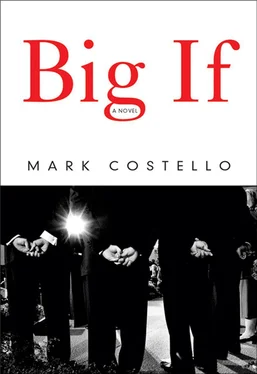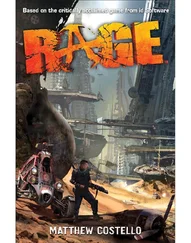“Thank you,” said Meredith.
Head said, “Let them have the past, the future, the near future. That still leaves one time realm unexploited: the present.” He looked around the table. “Nothing crawls the flesh like the near-at-hand. Let’s draw our monsters from the nightly news. Think about it, people. What if famous serial killers made special guest appearances? I’m talking big names here, Bundy, Gacy, Gein, Manson live from Quentin. The Oklahoma City bomber, John Doe Number Two, the stocky ball-capped male they never caught. Salvadoran death squads, the Tonton Macoutes, brand-name ethnic cleansers.”
“Bundy’s dead,” said Meredith. “Gein too, I think.”
Head said, “I don’t mean the actual guys, living or dead, although if Manson would play ball — wow. I mean characters like them, recognizable products of our own time. What could be more dreadful?”
“Wouldn’t it get dated fast?” Digby asked. “That’s the beauty of the distant future.”
Head said, “We’ll be gone in eighteen months, IPO’d or RIP’d. Fast is not the problem.”
They covered other topics, the underbrush upgrades, the new audio fx. As the meeting ended, Meredith asked Jens to stay behind. They went into her office with the head creative.
Meredith installed herself behind her desk, a mass of spotless butcher block, a terrifying desk. “So,” she said. “What the fuck is up with Monster Todd?”
Jens said, “Any day now. I just have a few kinks to—”
“Six weeks overdue,” said the head creative.
“Don’t blame me,” said Jens. “The problem is your specs, Head. What’s the concept? Who is Todd? He’s just a kid. He stands there and he walks around. How am I supposed to write his logic if I don’t get the concept?”
Head yawned. “Want a concept? Here’s a concept, Jens. In every high school in this country, there is a quiet, troubled boy who is always thinking about murder. Maybe he is ugly, fat, or unpopular. Maybe he’s a half-assed Satanist or a pimpled white supremacist angered by the failures of his skin. He’s certainly a loser without normal friends or healthy extracurriculars. His parents don’t understand him, neither do his teachers — who can understand a bloody-minded child? So, yes, he’s misunderstood, that quaint teen complaint. He’s lonely, angry, hateful. He speaks his thoughts and they are dark and other kids make fun, so he goes to Pizza Hut and buys himself a gun. He brings the gun to school one day, planning to mow down. I say let’s put that kid, a trademark of our time, up on screen. The other kids will pay big bucks to hunt him through the corridors. That’s the concept, Jens. Stop bucking for the Nobel Prize and write some fucking code.”
Meredith said, “Are you a burnout, Jens?”
Jens said, “No.” He said this very quickly.
“Because this smoke shadow thing — I don’t understand. You geniuses in software, designing your cool toys, amusing yourselves. There are good, high-grossing monsters to be written, Jens, lead-pipe money-makers. There’s a business plan to execute. You guys don’t seem to accept this. How many coders in the Bot Pod, Jens?”
Jens said, “Nine including Mayer. He telecommutes from Honolulu.”
“We fired him three months ago,” said Meredith. “I meant to send an officewide e-mail.”
“Eight,” said Jens.
“Davey Tabor’s looking for a job,” said Meredith. “I don’t buy this shit about trekking through Quebec.”
“Tibet,” said Jens.
“I think it’s actually Nepal,” said Head.
“Naubek is a burnout,” Meredith continued. “Beltran’s off on another mental health day, fifth of five and it’s barely February. Lu Ping is brilliant but in love. Bjorn is clever but not solid. Prem is solid but not clever. But what do I know, Jens? I’m not down there with you. I can’t see who’s burning out, who’s burned. All I see is a smoke shadow.”
“And no Monster Todd,” said Head.
Jens said, “I’ve done pretty goddamn well by this company. If you’d just look at my shadow, you’d see—”
Head said, “Let’s fire Naubek. Tabor too, soon as he treks back.”
Meredith said, “I’ll tell Jaffe. He can put it all in one big e-mail.”
Jens said, “Fire Naubek? That’s ridiculous. Naubek wrote a big part of the code behind the game.”
“So?” said Meredith. “We can fire anyone, Jens. I believe that we could even fire you.”
“You can’t fire me,” Jens said. “ I invented Hamsterman. I invented Skitz the Cat. I invented Farty Pup and I did the early work on Seeing Eye.”
Jens went through several stages of reactionafter leaving Meredith and Head — vigilante anger, disbelief, the giggles, outrage giving way to a simmering self-pity. He left the plant, got in his car, and drove aimlessly around the air base, slowly facing up to the practical realities. Could they fire him? What would he tell Peta if they did? What about her plan for their family future — hang on for the IPO, get the options, reassess?
Trees closed in on either side of the winding road, second growth, or maybe third, red maple and slash pine, the softwood instaforest of New England. He passed the former weapons storage area, high razor-wire fences, guard towers like a prison or a concentration camp. This was where they had stored the tunas, as the airmen called them, the long and graceful megatons. The bunkers were still out there, deep, blast-absorbing shafts driven into sandy ground. Jens had read somewhere that the bunker pumps were broken, and the shafts were slowly filling with groundwater, and it had become a cult of sorts to local stoner kids, bunker-diving, trespass on a dare. They came up from Portsmouth, gangs on racing bikes. They cut through the outer razor-wire fence, dug under the great iron doors (all of this on summer nights, smoking God knows what, angel dust or crank or crack — he had read another story about drugs coming up the interstate from the Massachusetts mill towns, Lowell, Lawrence, Haverhill, hellholes if you’ve been there), and then the kids, at night, confronted blackness, the blackness of the shaft, a cool wind from beneath, and the sound of echoed dripping in the depths, and being kids, and being high, some of them dove in. What the hell was in there — frogs, piranhas, one or two forgotten tunas? The bravery of kids on drugs, amazing. Was there anybody braver than a sixteen-year-old asshole from the projects of North Portsmouth? He had read a story in the paper about a boy named Suarez, missing for three days before someone called the cops. Most of the story had been about this — missing for three days, or was it longer? The boy wasn’t Puerto Rican, as Jens had assumed, or Portuguese, as most people in North Portsmouth had once been, but rather Philippino, living with his mother, a cannery employee, and his grandmother, who expressed her fear and rage through an interpreter. The father was semi-in-the-picture, and the scandal was that no one, not the family, not the school, had noticed right away that the boy was missing or could state with certainty when he started being missing. It came out that the boy had been bunker-diving with his friends (Jens felt he had known this all along), and the cops sent a diver down to retrieve the body.
Through the trees along the road, Jens saw split-level houses with low-pitched roofs. He took a left and drove a loop on streets named for trees, Ash, Juniper, and Hemlock, a town of housing built for airmen in the ’50s, deserted in a day after Russia fell — a brick elementary school, four softball diamonds sharing an outfield, chain-link backstops falling over, swing sets in the high grass, hydrants on the corners, streetlights overhead, a whole ghost subdivision.
Читать дальше












